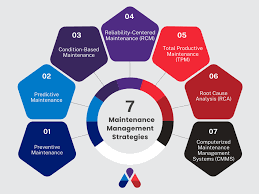The Importance of Regular Maintenance for Your Vehicle
Regular maintenance is crucial for keeping your vehicle in top condition and ensuring its longevity. By following a routine maintenance schedule, you can prevent costly repairs, improve safety on the road, and maintain the value of your vehicle.
Benefits of Regular Maintenance:
- Preventative Care: Regular maintenance helps identify potential issues early on, allowing you to address them before they escalate into major problems.
- Improved Performance: Well-maintained vehicles operate more efficiently, providing better fuel economy and overall performance.
- Enhanced Safety: Proper maintenance ensures that all components of your vehicle are functioning correctly, reducing the risk of accidents due to mechanical failures.
- Prolonged Lifespan: By taking care of your vehicle through regular maintenance, you can extend its lifespan and enjoy it for years to come.
- Resale Value: Vehicles with a documented history of regular maintenance typically have higher resale value compared to those with neglected upkeep.
Key Maintenance Tasks:
Some essential maintenance tasks that should be performed regularly include:
- Oil Changes: Regular oil changes help lubricate the engine and prevent wear and tear on vital components.
- Tire Rotations: Rotating tires regularly ensures even wear and extends their lifespan.
- Brake Inspections: Checking brakes for wear and tear helps maintain optimal braking performance.
- Fluid Checks: Monitoring fluid levels such as coolant, transmission fluid, and brake fluid is essential for proper vehicle function.
- Air Filter Replacements: Changing air filters improves engine performance and fuel efficiency.
In conclusion, regular maintenance is key to keeping your vehicle running smoothly and safely. By investing in routine upkeep, you can avoid unexpected breakdowns, save money on repairs, and enjoy a reliable driving experience. Remember that preventative maintenance is always more cost-effective than reactive repairs!
Essential Home Maintenance Tips: 9 Key Steps to Keep Your House in Top Shape
- Regularly inspect and replace air filters in HVAC systems.
- Keep gutters clean to prevent water damage to the roof and foundation.
- Check for leaks and drips in plumbing fixtures and repair them promptly.
- Trim trees and bushes near the house to prevent damage from branches or roots.
- Clean dryer vents to prevent fire hazards and improve efficiency.
- Inspect and maintain seals on windows and doors to improve energy efficiency.
- Regularly test smoke detectors and carbon monoxide alarms, replacing batteries as needed.
- Flush water heaters annually to remove sediment buildup that can reduce efficiency.
- Schedule regular professional inspections of electrical systems, plumbing, roofing, etc., for early detection of issues.
Regularly inspect and replace air filters in HVAC systems.
Regularly inspecting and replacing air filters in HVAC systems is a crucial maintenance tip to ensure optimal performance and indoor air quality. Clean air filters help the system operate efficiently by allowing proper airflow and reducing strain on the equipment. Additionally, replacing dirty or clogged filters prevents dust, allergens, and pollutants from circulating in your home or office, promoting a healthier environment for occupants. By following this simple maintenance task, you can extend the lifespan of your HVAC system and enjoy cleaner, fresher air throughout your space.
Keep gutters clean to prevent water damage to the roof and foundation.
To prevent water damage to the roof and foundation of your home, it is essential to keep gutters clean. Clogged gutters can lead to water overflow, which can seep into the roof, causing leaks and structural damage. Additionally, excess water near the foundation can weaken its integrity over time. By regularly clearing out debris from your gutters, you can ensure proper drainage and protect your home from costly water-related issues in the long run.
Check for leaks and drips in plumbing fixtures and repair them promptly.
Regularly checking for leaks and drips in plumbing fixtures is a crucial maintenance tip to ensure the integrity of your home’s water system. Even minor leaks can lead to significant water wastage and potential damage to your property over time. By promptly repairing any leaks or drips, you not only conserve water but also prevent costly repairs and mold growth. Regular maintenance of plumbing fixtures helps maintain the efficiency of your home’s water system and promotes a healthier living environment for you and your family.
Trim trees and bushes near the house to prevent damage from branches or roots.
To prevent damage from branches or roots, it is essential to trim trees and bushes near your house regularly. Overgrown branches can pose a risk of falling during storms, causing damage to your property. Additionally, tree roots can extend underground and potentially disrupt the foundation of your home or damage underground pipes. By maintaining a safe distance between vegetation and your house, you can protect your property and ensure the safety and integrity of your home for years to come.
Clean dryer vents to prevent fire hazards and improve efficiency.
Regularly cleaning your dryer vents is essential to prevent fire hazards and enhance efficiency. Over time, lint and debris can accumulate in the vents, increasing the risk of a fire breaking out due to overheating. By keeping the vents clean, you not only reduce this danger but also improve the efficiency of your dryer. A clear vent allows hot air to flow freely, helping your clothes dry faster and saving energy in the process. Prioritizing this simple maintenance task can go a long way in ensuring both safety and performance in your laundry routine.
Inspect and maintain seals on windows and doors to improve energy efficiency.
Inspecting and maintaining seals on windows and doors is a simple yet effective tip to enhance energy efficiency in your home. Over time, seals can wear out or become damaged, leading to drafts that allow heat to escape during the winter and cool air to seep out in the summer. By regularly checking and repairing these seals, you can prevent energy loss, reduce your utility bills, and create a more comfortable indoor environment. Taking care of these small maintenance tasks not only helps conserve energy but also contributes to a greener and more sustainable lifestyle.
Regularly test smoke detectors and carbon monoxide alarms, replacing batteries as needed.
It is crucial to regularly test smoke detectors and carbon monoxide alarms in your home and RV, ensuring they are functioning properly to protect you and your loved ones. Replace batteries as needed to guarantee these life-saving devices are always ready to alert you in case of a fire or carbon monoxide leak. Taking this simple maintenance step can provide peace of mind and potentially save lives in emergency situations.
Flush water heaters annually to remove sediment buildup that can reduce efficiency.
To maintain the efficiency of your water heater, it is recommended to flush it annually to eliminate sediment buildup. Over time, minerals and debris can accumulate in the tank, hindering its performance and reducing energy efficiency. By flushing the water heater regularly, you can ensure optimal operation and prolong its lifespan, ultimately saving on energy costs and preventing potential issues down the road.
Schedule regular professional inspections of electrical systems, plumbing, roofing, etc., for early detection of issues.
To ensure the optimal performance and longevity of your RV, it is essential to schedule regular professional inspections of key systems such as electrical, plumbing, and roofing. By proactively monitoring these critical components, you can detect any potential issues early on and address them before they escalate into costly repairs. Professional inspections not only help maintain the safety and functionality of your vehicle but also provide peace of mind knowing that your RV is in top condition for your next adventure.



